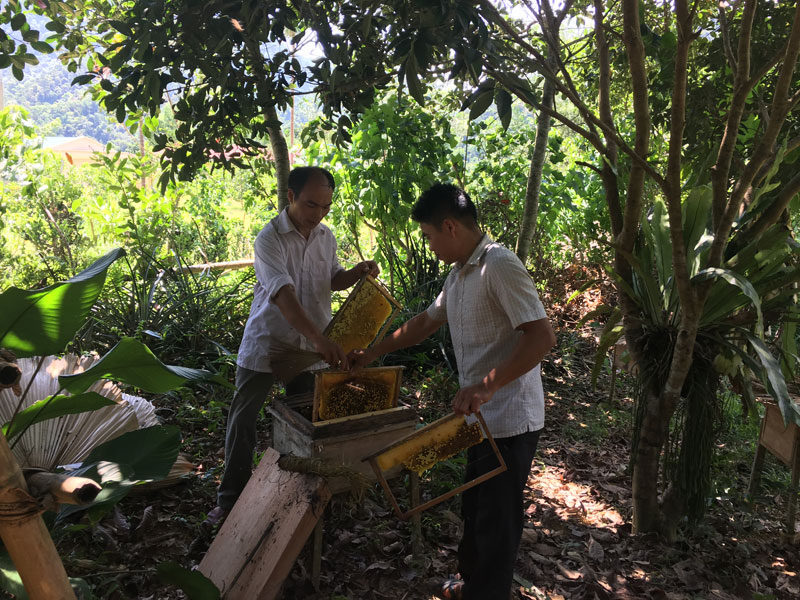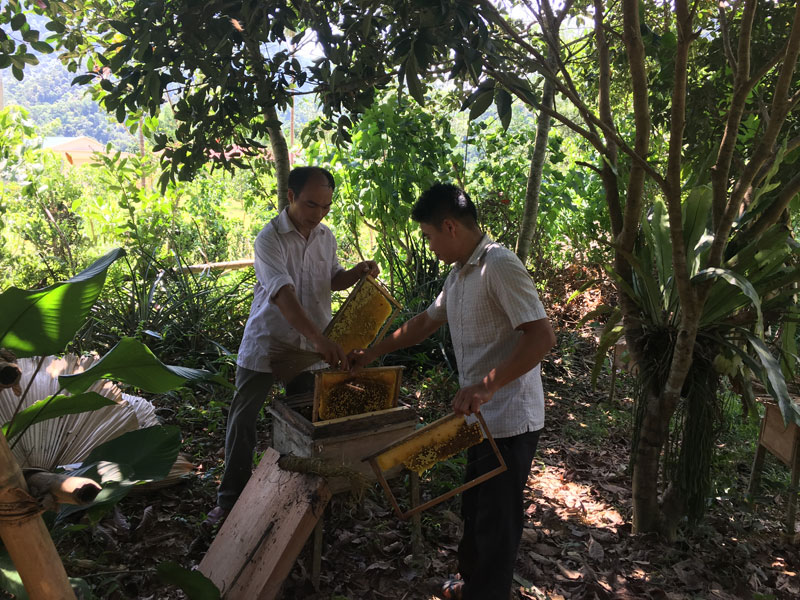
(HBO) – We had to travel through a bumpy road to reach a mountainous commune of Tu Do (Lac Son district), home to a variety of pure and viscid honey bearing scent of mountain and wild flowers.

Bui Van Nhuan of Tren hamlet, Tu Do commune (Lac Son district)
collects honey from forest bees.
Bui Van Nhuan of Tren
hamlet, who collects honey from bees raised in the forests, said that his
family currently keeps four beehives. The bees return to their hives to make
honey and every day, they come to the forests to search for food and suck
pollen from dawn till dusk.
Before, Nhuan’s family
only kept one hive, but with the support of a poverty alleviation programme,
the number went up to four. He collects about
50 litres of honey in
each crop. With a current price of about 280,000 VND per litre, his family’s
earnings from beekeeping has increased by tens of millions dong, becoming the family’s
main source of income.
Families of local
beekeeper still follow traditional method to collect honey. Accordingly, the
wax, which is full of honey, will be squeezed manually.
Local beekeepers revealed
that to collect pure honey, they have to prepare all equipment for honey
collecting, along with funnel, honey vibrating filter machine, bee brush,
knife, bee smoke sprayer and gloves, among others. All equipment must be clean
before the process.
Each honey crop is one
month apart and time for honey collecting lasts about half a year, usually from
April to September, when the weather is warm and flowers blossom all over the
forest.
It is also the time that
local beekeeping families are ready for their annual honey collecting. Every
household patiently waits until the frame hives are fully coated with bee wax,
they would start to take those frames out and collect honey.
Bui Van Tue, head of the
beekeepers in Tren hamlet said local beekeepers have to be patient in order to
obtain fully ripe and high-grade honey. According to statistics, the commune is
home to more than 70 beekeeping households in Sat Thuong, Trên, Tren, Khay, Mu
and Mon hamlets, which scatter in those localities.
Only Tren hamlet has the
most concentrated beekeeping area with participation of 37 families and over
200 bee colonies. It is also the first hamlet that has formed a beekeeping
group which has gone under fundamental technical training with support of each
group member.
Bui Ngoc Thien, Chairman
of the People’s Committee of the hamlet said local people have tapped the
potential of the rich natural forest in the Ngoc Son – Ngo Luong Natural
Reserve to keep forest bee for honey, greatly increasing local income and
improving living standards./.
According to data from the Hoa Binh Provincial Party Committee, the industrial production index for the first six months of 2025 is estimated to have increased by 20% compared to the same period last year. This marks the highest year-on-year growth rate for this period since 2020.
In the first six months of 2025, Hoa Binh province’s export turnover was estimated at 1.145 billion USD, marking an 18.11% increase compared to the same period in 2024. Import turnover was estimated at $ 804 million, a 17.15% increase, which helped the province maintain a positive trade balance.
The lives of the ethnic minority farmers in Tan Lac district have gradually improved thanks to the new directions in agricultural production. This is a testament to the collective strength fostered through the professional associations and groups implemented by various levels of the district’s Farmers’ Union.
With the motto the "product quality comes first,” after nearly one year of establishment and operation, Muong village’s Clean Food Agricultural and Commercial Cooperative, located in Cau Hamlet, Hung Son Commune (Kim Boi district), has launched reputable, high-quality agricultural products to the market that are well-received by consumers. The products such as Muong village’s pork sausage, salt-cured chicken, and salt-cured pork hocks have gradually carved out a place in the market and they are on the path to obtaining the OCOP certification.
In the past, the phrase "bumper harvest, rock-bottom prices" was a familiar refrain for Vietnamese farmers engaged in fragmented, small-scale agriculture. But today, a new spirit is emerging across rural areas of Hoa Binh province - one of collaboration, organisation, and collective economic models that provide a stable foundation for production.
Maintaining growing area codes and packing facility codes in accordance with regulations is a mandatory requirement for agricultural products to be eligible for export. Recently, the Department of Agriculture and Environment of Hoa Binh province has intensified technical supervision of designated farming areas and packing facilities to safeguard the "green passport" that enables its products to access international markets.



